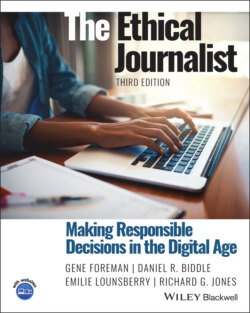Читать книгу The Ethical Journalist - Gene Foreman - Страница 26
A Different Role for Journalists
ОглавлениеToday’s news consumer can draw on a vast array of information sources. The day is long past when editors in a distant newsroom decided what information was worthy of passing along to the public, and what was not. “Journalists can no longer be information gatekeepers in a world in which gates on information no longer exist,” Cecilia Friend and Jane B. Singer wrote in Online Journalism Ethics.19
Twenty‐first‐century journalism requires a different interpretation of the gatekeeper role. A democratic society now depends on journalists to be its surrogates in sifting the huge volume of information available, testing it for accuracy, and helping citizens understand it. “Gatekeeping in this world is not about keeping an item out of circulation,” Friend and Singer wrote. “[I]t is about vetting items for their veracity and placing them within the broader context that is easily lost under the daily tidal wave of ‘new’ information.”20
In The Elements of Journalism, Kovach and Rosenstiel wrote that, in the new environment, a journalist must play the roles of Authenticator and Sense Maker. As Authenticator, the journalist works with audiences to sort through the different accounts of a news event and helps them “know which of the facts they have encountered they should believe and which to discount.” As Sense Maker, the journalist puts “events in context in a way that turns information into knowledge.”21
Although the technology for gathering and delivering the news has changed exponentially, the public’s need for reliable information is the same. Confronting a daily deluge of information, citizens who are deeply interested in current events will look for sources they can trust.
More than ever, they will depend on ethical journalists.
